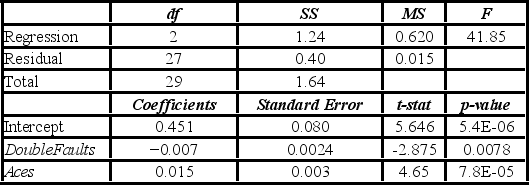Essay
Data was collected for 30 professional tennis players regarding their performance in Grand Slams (the four major tennis tournaments in the world). The response variable Win, expressed as a proportion ranging from 0 to 1, is believed to depend on two explanatory variables: the percentage of the Double Faults and the number of Aces. The following model is estimated: Win = β0 + β1DoubleFaults + β2Aces + ε. A portion of the regression results is shown in the accompanying table.  a. Predict the winning percentage for a player who had 20 double faults and five aces.
a. Predict the winning percentage for a player who had 20 double faults and five aces.
B) Interpret the slope coefficient for the variable DoubleFaults.
C) Calculate the standard error of the estimate.
D) Calculate and interpret the coefficient of determination.
E) Calculate the adjusted R2.
Correct Answer:

Verified
a. 38.6%
b. If DoubleFaults go up by 1%,...View Answer
Unlock this answer now
Get Access to more Verified Answers free of charge
Correct Answer:
Verified
b. If DoubleFaults go up by 1%,...
View Answer
Unlock this answer now
Get Access to more Verified Answers free of charge
Q64: A marketing analyst wants to examine the
Q65: Consider the sample regression equation <img src="https://d2lvgg3v3hfg70.cloudfront.net/TB6618/.jpg"
Q66: A statistics student is asked to estimate
Q67: When estimating a multiple regression model, the
Q68: An analyst examines the effect that various
Q70: The standard error of the estimate measures
Q71: A sample of 30 observations provides the
Q72: A manager at a local bank analyzed
Q73: Costco sells paperback books in their retail
Q74: The following portion of regression results was